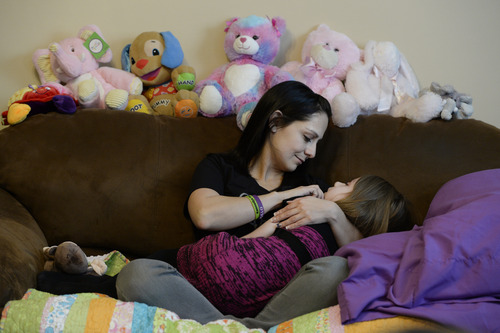This is an archived article that was published on sltrib.com in 2014, and information in the article may be outdated. It is provided only for personal research purposes and may not be reprinted.
Known for its quirky alcohol laws, Utah may seem the last place to embrace medical marijuana.
But a bill that would allow trial use of non-intoxicating cannabis oils by Utahns with untreatable epilepsy made steady progress this Legislative session, clearing both the House and Senate by wide margins.
Named "Charlee's Law" in honor of a 6-year-old from West Jordan who won't live long enough to benefit from the measure, HB105 is expected to be signed by governor.
Getting this far required compromise and assurances that HB105 won't open the door to broader medical use of marijuana or full-blown legalization.
Unsure of the oil's safety and long term benefits, lawmakers loaded HB105 with restrictions. Only those with intractable epilepsy and written permission from a board-certified neurologist could apply to the Utah Department of Health for a waiver giving them permission to import cannabis oil.
The oil would have to be certified to contain at least 15 percent cannabidiol (CBD), the chemical believed to have anti-seizure properties, and less than 0.3 percent of tetrahydrocannabinol, or THC, the psychoactive chemical that gives marijuana users a high.
Law enforcement officials who encounter "hemp waivers" would be able to check their authenticity with the health department. Neurologists would have to send their written permission to health officials electronically to avoid forged recommendations.
The bill will expire two years after its July 1, 2014 effective date, allowing further legislative review.
Additionally, HB105 would allow higher education institutions to seek permits from the state Department of Agriculture to grow industrial hemp for research.
Gov. Gary Herbert said he is comfortable with the concept of using cannabis oil to help treat seizures and other medical conditions, but stressed the need for quality controls and access provided through "some kind of prescription" just like "any other medication." Having not yet read the bill, he wouldn't say whether he'll sign it.
But a "grateful" Jennifer May, co-founder of Hope 4 Children With Epilepsy (H4CE), hopes Herbert will sign "Charlee's Law" on March 25 to coincide with International Purple Day, celebrating epilepsy awareness. "The words of support from legislators, along with their affirmative votes on our behalf," she said, "show an immense understanding and compassion for the suffering of the children and families of H4CE."



